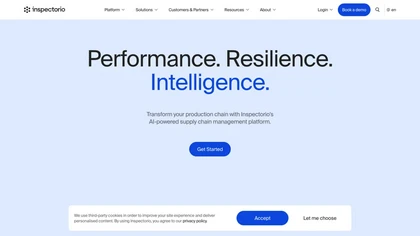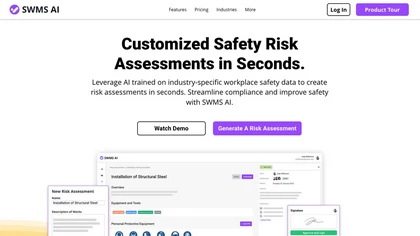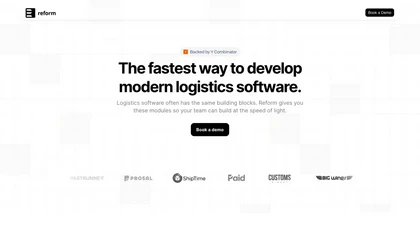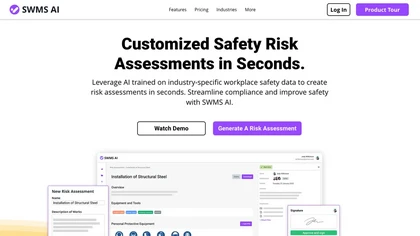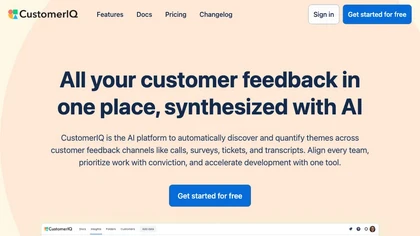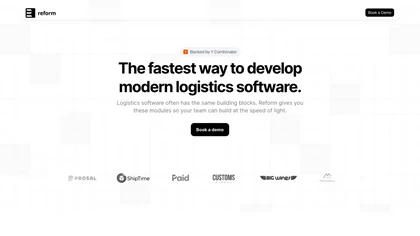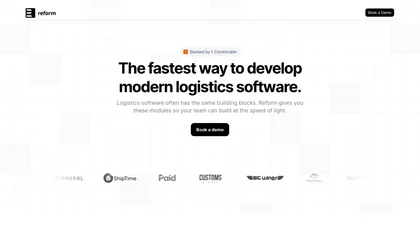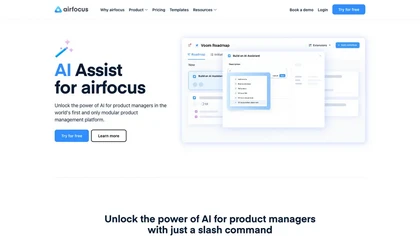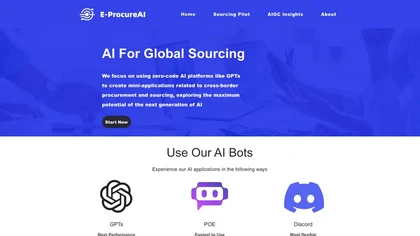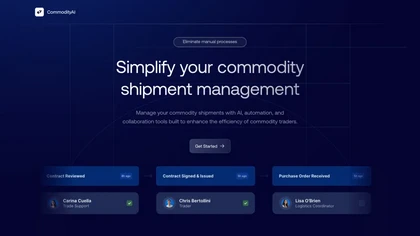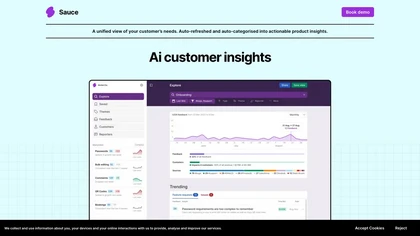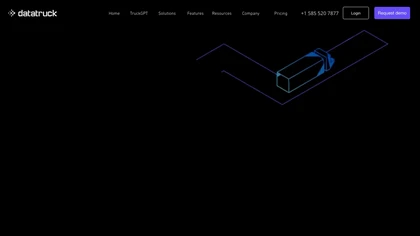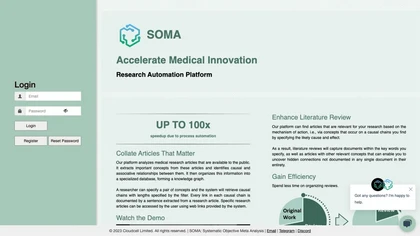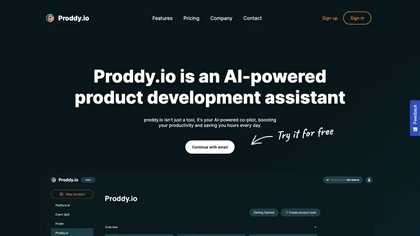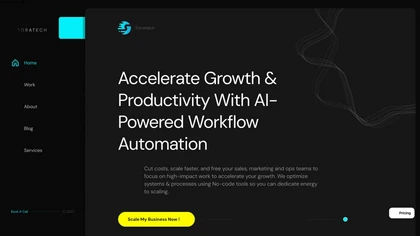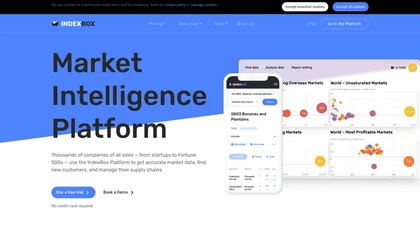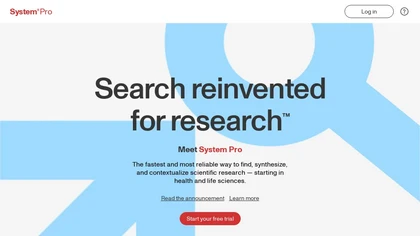AI use cases for Manufacturing Operations
Generative AI can be applied in various applications for manufacturing operations. Here are some examples to explore below for inspiration with AI tools to get you started with using AI in manufacturing operations.
🛠️ 70 AI tools for Manufacturing Operations
Explore a dynamic list of some of the most popular tools to get you started with various AI use cases and applications for Manufacturing Operations to streamline your workflows and productivity today.
inspectorio.com features
- AI-powered supply chain management platform
- Utilization of innovative technologies like AI
- Digitizes and connects supply chain processes within a single tool
- Enables intelligent analysis of the entire ecosystem
- Reduces production chain risks through advanced analytics
SWMS AI features
- Tailored risk assessments generation
- Customizable safety policies
- Personalized document generation
- Integration of AI assistant for safety information
- Streamlining compliance processes
Reform features
- Modular building blocks for customized solutions
- State-of-the-art multimodal AI models for logistics documentation
- Automation of data capture for various documents
- Seamless integration with universal transportation management systems (TMS) through a universal API
- Embeddable customer dashboards for real-time data insights
5-Out features
- Predicting sales
- Optimizing labor
- Optimizing purchasing
- Quick setup
- Getting started
Typo features
- Measure effort and cost spent on innovation
- Technical debt
- Roadmap
- Identify sdlc metrics that impact development efficiency
- Remove blockers in real-time
GeniePM features
- Product requirements
- User stories
- Use cases
MEJ ERP AI features
- Intelligent automation
- Data-driven insights
- Real-time analytics
- Predictive forecasting
- Seamless integration capabilities
🔥
Create your account, save tools & get personal recommendations
Receive a weekly digest of our handpicked top tools.
Unsubscribe anytime
SWMS features
- AI risk assessments
- Safety Co-Pilot integration
- Customization options
- Quickly generate safe work sequences
- AI-powered safety recommendations
Process features
- AI-powered task generation
- Automated task creation process
- Task generation based on project requirements and deadlines
- Advanced security measures for data privacy
- Workflow simplification
CustomerIQ features
- Aggregate feedback from various channels
- Powerful analytics for customer feedback
- Chat with data
- Automated segmentation and tagging
- Multiple integrations available
Cycle 3.0 features
- Fast integrations
- Semantic search
- Auto generation of titles
- Syncing customer data
- Visualizing feedback
LEAFIO AI Retail features
- AI-driven supply chain and retail automation software
- Automation of inventory optimization, assortment management, planogram optimization, and promotion efficiency
- Features such as demand forecasting, automatic replenishment, and merchandising process optimization
- Caters to various industries including retail, grocery, convenience stores, pharmacies, liquor stores, etc.
- Comprehensive suite of AI-powered tools to streamline retail operations and drive profitable growth
Perceptif features
- Auto-discovery
- Custom experiences
- Process optimization
- Benchmarking solutions
- Competitor analysis
Inventory365 features
- Real-Time Inventory Tracking
- Warehouse Management
- Multi-location Fulfillment
- AI-Powered Demand Prediction
- Seamless Integration
Tech Web Planet features
- Advanced quality control solutions
- In-depth insights for enhancing app quality
- AI-driven capabilities
- Streamlining app development lifecycle
- Top-notch product delivery
Reform features
- Modular building blocks for rapid customization
- Automated data extraction from various documents
- Seamless integration with universal TMS platforms
- Real-time visibility into logistics data
- Efficient data scraping from multiple sources
Prodhub.ai features
- Task automation
- Auto-generation of product requirements
- Proprietary data generative AI
- Collaborative product development
- Export to various tools
FutrOS features
- Unified operating system
- Warranty management
- Digital twin technology
- Automated performance insights
- Real-time alerts
Dairytech.ai features
- milkround automation
- automatic payment collection
- stock reconciliation
- online order management
- customer communication
Unfig features
- Automated data capture from various logistics documents
- Universal TMS integrations for seamless connectivity
- Embeddable customer dashboards for real-time data insights
- Scraping information from numerous sources for visibility into logistics data
- Streamlining logistics operations with unprecedented speed and efficiency
AI Assist by airfocus features
- AI-generated ideas and drafts
- Sentiment analysis
- Utilize slash commands
- Prompt features for PRDs and user stories creation
- Feedback sentiment analysis
Flowsage Beta features
- AI-powered completions
- Intelligent auto-completions
- Real-time collaboration
- Analyzing and optimizing flowcharts
- AI-driven chat support
Inventive features
- Streamline rfis, rfqs, security reviews, rfps
- Generate reliable answers with ai
- Reduce reliance on subject matter experts
- Save substantial time and effort
- Up-to-date content
Product Manager OS features
- AI-powered system
- Task prioritization
- Development management resources
- Customer discovery tools
- A/B testing frameworks
WasteAID features
- Automatic route auditing
- Integration with existing systems
- Audit over 400k generators and 1m+ pickups
- Detect overflow incidents and identify contamination
- Tracking commercial account compliance
Demand Forecast features
- Utilizes classical machine learning algorithms
- Allows uploading data sets from Excel
- Automatically selects the best model for each product
- Provides clear visualizations and interactive graphs for demand predictions
- Includes features like historical data analysis, outlier detection, model competition algorithms, and KPI forecast systems
E-Procure AI features
- Zero-code AI platform integration
- Recommendation of supply locations and suppliers
- Market expansion assistance
- Product opportunity identification
- Real-time exchange rate inquiries
Fluency.com features
- Automated Process Documentation
- Process Insights
- AI Assistant
- Automations
- Audit View
FolioProjects features
- AI project management assistant
- Data-rich dashboards for analysis
- Project portfolio management workflow
- Enterprise asset management life cycle support
- Predictive, prescriptive, and generative AI capabilities
Green Suggest features
- AI-powered upcycling suggestions
- Personalized upcycling ideas based on user preferences
- Vast database of relevant content and DIY tutorials
- Reduction of textile waste
- Promotion of eco-conscious fashion choices
CommodityAI features
- Automated shipment processes
- Auto-generated shipping nominations
- Real-time shipment tracking
- AI-driven performance analytics
- Smart data extraction
Forescribe features
- Discover, analyze, and manage integrations of SaaS applications
- Provide real-time insights on SaaS usage and compliance
- Automated compliance checks for SaaS applications
- Offer cost optimization suggestions for SaaS applications
- Enhance transparency in digital landscape governance
viable features
- Automated qualitative data analysis
- Customer feedback understanding
- Nlp technology
- Feedback analysis
DrugCard features
- Automates drug safety routines
- Multiple languages and countries
- High-performance screening
Sauce features
- Auto-refreshing of customer needs
- Auto-categorizing of actionable product insights
- Real-time understanding of customer needs
- Monitoring of problem areas
- Data security with encryption
Timely Platform features
- Streamlined workflows
- Enhanced productivity
- Easy-to-use interface
- Real-time reporting
- SMS alerts for reducing no-shows
Soon Pulse features
- Pre-built pulses
- Natural language processing technology
- Kpi monitoring
- Trend analysis
- Mental health check-ins
QA Sphere features
- Digital checklist for managing tests
- Building a library of test cases
- Planning tests efficiently
- Organized test case library
- Integration with issue trackers
sweepr.com features
- Personalized insights for digital customer care
- Adaptive decision-making
- Bespoke personalization
- Omnichannel support
- Generative AI capabilities
Ogoodo features
- Customizable statuses
- Sub-boards
- Time tracking
- AI-supported timeline predictions
- Lead and cycle time metric recording
Datatruck features
- Automating manual processes
- Providing reporting analytics
- Offering actionable insights through AI/ML analytics
- Hyper automation capabilities
- Seamless data integration and real-time visibility
Predict Expert AI features
- Crafting unique AI models
- Integrating intelligent applications and APIs
- Tailoring AI models and applications to address specific business needs
- Real-time operational insights
- Monitoring performance in real-time
Process AI features
- Workflow generation
- Manage due dates and timelines
- Assign tasks to team members
- Built-in approval processes
- Document analysis
InsightQ features
- AI product manager
- Provides essential insights
- Automates tasks such as document creation, customer feedback analysis, roadmap management, and market research
- Integrates with key platforms like Atlassian and Slack
- Empowers product managers with predictive analytics and AI automation
retalon.com features
- Predictive analytics
- Demand forecasting
- Merchandise planning
- Smart fulfillment
- Ecommerce operations
SOMA features
- Automating research process
- Collating and analyzing medical research articles
- Identifying causal and associative relationships
- Creating a knowledge graph for exploration
- API access for building pipelines in Python, R, or other languages
Glass features
- Omnichannel customer relationship automation
- Integration with various platforms like WhatsApp, chat APIs, Instagram, and QR codes
- Virtual business analyst capabilities
- AI-powered chatbots for 24/7 support and personalized engagements
- Predictive analytics for better product optimization
Jungle AI features
- Real-time monitoring
- Abnormal behavior detection
- Issue resolution collaboration
- Customizable for different industries
- Data-driven decision making
Painpoints features
- Tracking
- Analyzing
- Sifting
- Summarizing
- Organizing
Servcy features
- Consolidate data from multiple tools into one central location
- Aggregated inbox to view and respond to various communications in one place
- AI support to prioritize and respond to important messages promptly
- AI capabilities for storing and managing documents as well as answering questions
- Features for tracking payments, analyzing time, merging calendars, and providing planning insights
Kodus features
- Team performance analysis
- Improvement suggestions for increased productivity
- Automated management tasks
- Weekly reports and metrics
- Automation for enhancing team productivity
secretsaucepartners.com features
- Fit Predictor
- Style Finder
- Outfit Maker
- Seamless integration
- A/B testing
XO Analytics features
- E-commerce analytics platform
- Next-gen e-commerce integrations
- Customizable alerts
- Real-time performance monitoring
- Personalized data-driven tips
Proddy.io features
- Expert product management guidance
- Translate basic instructions into formal product management documentation
- Create a 3000-word product brief in less than a minute
- Generate user stories and personas in seconds
- Automatically analyze customer feedback
Soratech features
- AI-powered workflow automation
- No-code tools utilization
- Access to top-tier experts
- Fixed monthly subscription model
- Focus on automation solutions for various business functions
IndexBox
5IndexBox features
- Access to accurate market data
- User-friendly interface for quick generation of market reports
- Predictive modeling for forecasting market trends
- Machine learning capabilities
- Data integrity through cross-checking from multiple sources
PharmaTrace features
- Chronic disease management
- Early disease detection
- Economic costs reduction
- Budget forecasting
- Decision support
unitQ GPT features
- Aggregates feedback from various sources
- Automates categorization of feedback
- Evaluates sentiment of feedback
- Delivers actionable insights without manual effort
- Detects urgent issues sooner
Pi Exchange features
- End-to-end machine-learning tool
- Eliminates the need for coding
- Smart data preparation
- Model development
- Deployment functionalities
Smartersales features
- Integration with zoom, teams, and meet
- Automated crm data entry
- Instant personalized feedback
- Detailed performance dashboards and summarized email reports
- Customizable experience
Full.CX features
- Comprehensive Product Platform
- Harness the Power of Advanced GPT-4 AI Suggestions
- Next-Level Creativity
- Informed and Intelligent AI Suggestions
- Harness AI for Rapid Content Generation
LookBook features
- Sustainable outfits
- Tailored to individual tastes
- User-friendly interface
- Virtual models
- Step-by-step guidance
Zuro features
- Generative AI solutions
- LLM technology
- Structured and unstructured data processing
- Predictive model creation
- End-to-end workflow integration
System Pro features
- Synthesizing relevant scientific data
- Sifting through vast amounts of data
- Offering a faster and more reliable search experience
- Seamlessly exploring a wide range of topics
- Contextualizing research findings
Standuply features
- Streamlines standup meetings
- Automates essential processes through team surveys
- Conducts asynchronous meetings via text, voice, or video
- Seamlessly integrates with task trackers for efficient task management within Slack and Teams
- Integrates with Jira apps for revolutionized time tracking and backlog refinement
Skipped features
- Collaborative fulfillment platform
- Enables selling out-of-stock product variants
- Real-time e-commerce network
- Capturing sale opportunities easily
- Sharing of margins within merchant network
Mom shop app features
- AI-powered features
- Streamlined e-commerce
- Effective service management
- AI-generated content
- Simplified order management
empress.eco features
- AI-powered automation
- On-demand outsourcing solutions
- Software integrations
- Helpdesk services
- Industry-specific solutions
Productroadmap features
- Automatically connects with crm and support tools
- Prioritizes feature gaps based on revenue potential
- Surfaces key themes, common feature requests
- Streamlines collaboration between product teams
